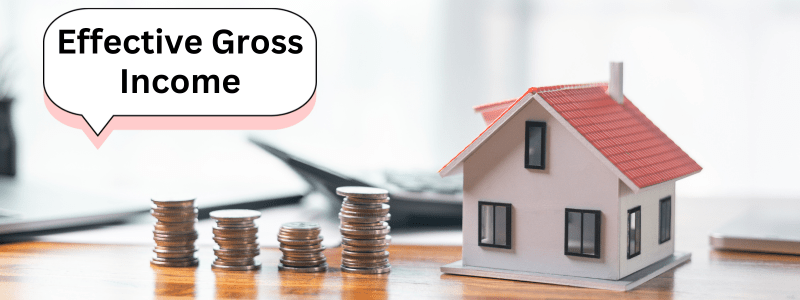
Ever wondered what Effective Gross Income (EGI) really means and why it’s such a big deal in the world of real estate? Well, you’re in the right place. Whether you’re a seasoned investor or just dipping your toes into the property market, understanding EGI can make a world of difference in your investment decisions.
Understanding the Basics
What is Effective Gross Income?
Effective Gross Income is like the superstar of the rental income world. It’s the total income a property generates from all sources before deducting any expenses but after accounting for vacancy losses and collection losses. Think of it as the “almost final” figure that gives you a realistic idea of what you’ll actually bring in.
Components of Effective Gross Income
- Rental Income: This is the bread and butter of your property income.
- Other Income: This includes income from parking, laundry facilities, vending machines, or any other amenities.
- Vacancy Losses: This is the income you lose when your property isn’t fully rented out.
- Collection Losses: This covers the income you expect but don’t receive due to non-payment.
Calculating Effective Gross Income
Step-by-Step Calculation
- Calculate Total Potential Rental Income (PRI): Multiply the number of units by the rental price per unit.
- Add Other Income: Include all additional income sources.
- Subtract Vacancy Losses: Estimate the income lost due to vacant units.
- Subtract Collection Losses: Estimate the income lost due to non-payment.
Example Calculation
Let’s break it down with an example. Suppose you have a property with 10 units, each renting for $1,000 per month.
- Total Potential Rental Income: 10 units * $1,000 = $10,000
- Other Income: $500 (from laundry facilities)
- Vacancy Losses: $1,000 (one vacant unit)
- Collection Losses: $200 (one tenant didn’t pay)
Effective Gross Income: $10,000 + $500 – $1,000 – $200 = $9,300
Factors Affecting Effective Gross Income
Rental Income
The core component of EGI. Any rent increase directly boosts your EGI.
Vacancy Rates
High vacancy rates can significantly slash your EGI. Keeping your property attractive to tenants is key.
Other Income Sources
Don’t overlook additional income from amenities. They can add a nice boost to your EGI.
Effective Gross Income vs. Gross Income
Key Differences
Gross Income is the total income a property could potentially generate, while Effective Gross Income accounts for the real-world challenges of vacancies and non-payment.
Why the Distinction Matters
Knowing your EGI gives you a more accurate picture of your property’s profitability, which is crucial for making informed investment decisions.
Effective Gross Income in Real Estate
Role in Property Valuation
Effective Gross Income is a vital metric in valuing a property. Higher EGI often translates to a higher property value.
Impact on Investment Decisions
Investors rely on EGI to assess whether a property is a good investment. It helps in predicting the potential return on investment (ROI).
Maximizing Effective Gross Income
Strategies for Increasing Rental Income
- Upgrade Units: Modernize appliances, update interiors, and improve amenities.
- Adjust Rent Strategically: Regular, small increases are often better accepted by tenants.
Reducing Vacancy Rates
- Effective Marketing: Highlight the best features of your property.
- Tenant Retention Programs: Offer incentives for long-term leases.
Diversifying Income Streams
- Add Amenities: Think about additional services like parking, storage, or laundry facilities.
- Host Events: Use common areas for community events and charge a small fee.
Common Mistakes to Avoid
Overestimating Income
Be realistic with your income projections. Overestimating can lead to financial trouble.
Ignoring Market Trends
Stay updated with the rental market trends. Adjust your rents according to market conditions.
Neglecting Maintenance Costs
Regular maintenance is crucial. Ignoring it can lead to higher vacancy rates and collection losses.
Tools and Resources
Software for Calculating Effective Gross Income
- Property Management Software: Tools like Buildium or AppFolio can help.
- Spreadsheets: A good old Excel spreadsheet works wonders too.
Online Resources and Calculators
Websites like Zillow and Rentometer offer tools to help calculate potential rental income and compare market rents.
Effective Gross Income in Commercial Real Estate
Differences from Residential Real Estate
Commercial leases often have different structures, impacting how EGI is calculated and maximized.
Important Considerations
- Lease Terms: Longer leases in commercial real estate provide more income stability.
- Tenant Quality: High-quality tenants can reduce vacancy and collection losses.
Tax Implications

Understanding Taxable Income
EGI plays a role in determining your taxable income, influencing your tax liabilities.
Effective Gross Income and Tax Deductions
Knowing your EGI helps in planning for tax deductions and understanding your tax obligations better.
Future Trends
Emerging Trends in Real Estate Income
- Tech Integration: Using technology to improve tenant experience and streamline operations.
- Sustainable Properties: Green buildings are attracting higher rents.
Predictions for Effective Gross Income
- Increasing Rental Rates: As demand rises, so do rental rates.
- Flexible Spaces: More properties will offer adaptable spaces to meet tenant needs.
Conclusion
Understanding Effective Gross Income is crucial for any real estate investor. It provides a realistic picture of your income, helping you make informed decisions and maximize your investment. Keep these insights in mind, and you’ll be well on your way to becoming a savvy investor.
FAQs
1. What is the difference between Effective Gross Income and Net Operating Income?
Effective Gross Income is the total income after accounting for vacancy and collection losses but before expenses. Net Operating Income is what you get after subtracting all operating expenses from EGI.
2. How can I improve my Effective Gross Income?
Increase rental income, reduce vacancy rates, and diversify your income streams.
3. What role does Effective Gross Income play in real estate investment?
It helps investors assess the profitability and value of a property, guiding investment decisions.
4. Can Effective Gross Income be negative?
No, EGI cannot be negative. However, high vacancy and collection losses can significantly reduce it.
5. How often should I recalculate my Effective Gross Income?
Regularly, at least once a year, or whenever there are significant changes in your property’s income or expenses.
To learn more about becoming a successful investor, read our comprehensive guide on how to become a successful investor.
